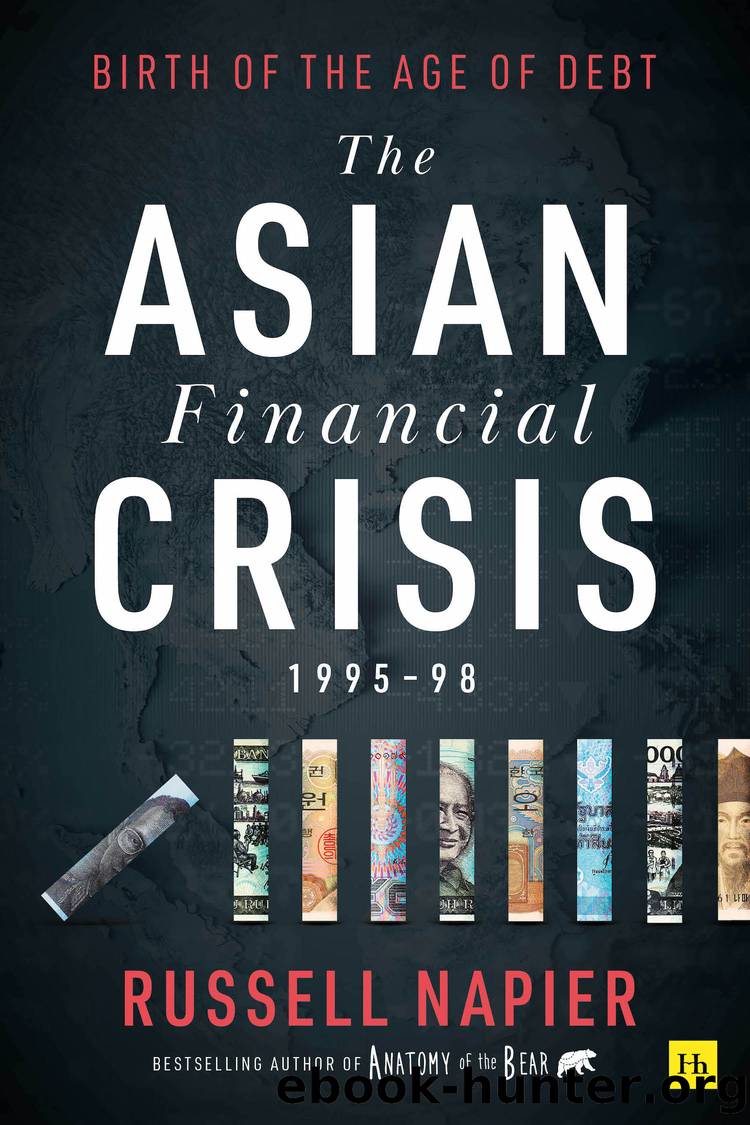The Asian Financial Crisis 1995â98 by Russell Napier

Author:Russell Napier
Language: eng
Format: epub
Publisher: Harriman House
Published: 2021-07-05T17:39:40+00:00
Throughout the Asian financial crisis there were significant amounts of wishful thinking, probably because detailed analysis to establish value was so difficult. Much of what passed for analysis was trying to assess which companies would âhaveâ to be saved and which could be let go to the wall. A simple analysis would say that the arrival of the IMF would improve the chances that equity would survive.
The Thai government suddenly had access to the funds that could be used to sustain what would otherwise be the unsustainable. It was not to be so easy. The IMF were to insist that some companies, particularly banks and finance companies, were closed. As the crisis developed, their demands were to become more extreme, demanding the type of root and branch reform that would have destroyed the existing form of capitalism, particularly in Indonesia and South Korea, and significantly increased the risk of mass bankruptcies. Even by the summer of 1997 it was evident that the IMFâs arrival in Asia would augur some form of structural change, but few investors considered whether such reforms were compatible with what had been previously lauded as Asian values.
What none of us appreciated until much later in the crisis was that behind the IMF, exerting considerable influence, was the US Treasury Department. The secretary of the Treasury, Robert Rubin, and his deputy, Larry Summers, saw an opportunity to open up the Asian economies for international, for which read US, business. The more pain felt by the supplicant governments, the greater the prospect that they would accede to such demands to open their economies.
This was an Asian financial crisis, but very soon it developed into an attempt to bring a different form of capitalism to Asia. Investors who had been aware of the agenda of the US Treasury may have been more cautious on investing based on the belief that the capital inflow from the IMF would act to save the remnants of equity in the region remaining post the devaluations.
As the crisis developed, a drive for a form of business regime change became evident. Those who were invested in listed companies were invested in the old regime. That regime was now threatened with extinction by the very organisation some investors thought had arrived to save it.
The luxury and excitement of Southeast Asia
9 September 1997, New Asia
At this point in history, the investor is in a luxurious position in regard to analysis using the domestic risk-free rate. Equities in Southeast Asia (ex Singapore) are so overvalued that risk-free rates would have to fall significantly below the pre-âMekongâ crisis levels before fair value could begin to be established. At this stage the investorâs position is straightforward.
With interest rates very unlikely to return even to pre-Mekong crisis levels over the next 12 months, these markets are sells now. (A fall in interest rates below these levels is only likely to be achieved due to considerable currency weakness.) At a future date there will need to be a more careful assessment of exactly what risk-free rates are to be used.
Download
This site does not store any files on its server. We only index and link to content provided by other sites. Please contact the content providers to delete copyright contents if any and email us, we'll remove relevant links or contents immediately.
Machine Learning at Scale with H2O by Gregory Keys | David Whiting(4313)
Never by Ken Follett(3956)
Harry Potter and the Goblet Of Fire by J.K. Rowling(3857)
Fairy Tale by Stephen King(3396)
Unfinished: A Memoir by Priyanka Chopra Jonas(3389)
The Man Who Died Twice by Richard Osman(3078)
Will by Will Smith(2919)
It Starts With Us (It Ends with Us #2) by Colleen Hoover(2367)
Rationality by Steven Pinker(2363)
Can't Hurt Me: Master Your Mind and Defy the Odds - Clean Edition by David Goggins(2341)
The Dark Hours by Michael Connelly(2307)
The Storyteller by Dave Grohl(2236)
Friends, Lovers, and the Big Terrible Thing by Matthew Perry(2230)
The Dawn of Everything: A New History of Humanity by David Graeber & David Wengrow(2208)
The Becoming by Nora Roberts(2201)
The Stranger in the Lifeboat by Mitch Albom(2121)
Cloud Cuckoo Land by Anthony Doerr(2112)
Love on the Brain by Ali Hazelwood(2078)
Einstein: His Life and Universe by Walter Isaacson(2022)
